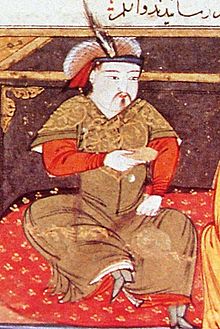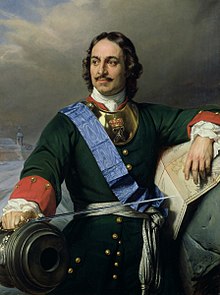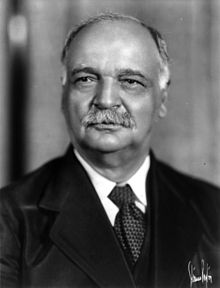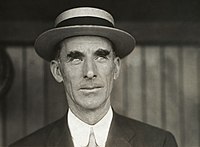February 8 is the 39th day of the year in the Gregorian calendar. There are 326 days remaining until the end of the year (327 in leap years).
Holidays
- Christian Feast Day:
- Earliest day on which Feast of Orthodoxy can fall, while March 14 is the latest; celebrated 42 days before Easter. (Orthodoxy)
- Nirvana Day (Mahayana Buddhism)
- Prešeren Day (Slovenia)
- Boy Scout Day – celebrates the birthday of scouting
- Clean out Your Computer Day – second Monday of Month
- Kite Flying Day – in the middle of winter!?!
History
In 421, Constantius III becomes co-Emperor of the Western Roman Empire.
In 1238, The Mongols burn the Russian city of Vladimir.
In 1250, Seventh Crusade: Crusaders engage Ayyubid forces in the Battle of Al Mansurah.
In 1265, Hulagu Khan, Mongol ruler (b. 1217) dies. He was a Mongol ruler who conquered much of Southwest Asia. Son of Tolui and the Kerait princess Sorghaghtani Beki, he was a grandson of Genghis Khan, and the brother of Ariq Böke, Möngke Khan and Kublai Khan. Hulagu’s army greatly expanded the southwestern portion of the Mongol Empire, founding the Ilkhanate of Persia, a precursor to the eventual Safavid dynasty, and then the modern state of Iran. Under Hulagu’s leadership, the Mongols destroyed the greatest center of Islamic power, Baghdad, and also weakened Damascus, causing a shift of Islamic influence to the Mamluks in Cairo. Under Hulagu’s dynasty, Iranian historians also moved from writing in Arabic, to writing in Persian.
In 1347, The Byzantine civil war of 1341–1347 ends with a power-sharing agreement between John VI Kantakouzenos and John V Palaiologos.
In 1575, Universiteit Leiden is founded, and given the motto Praesidium Libertatis.
In 1587, Mary, Queen of Scots, is executed on suspicion of having been involved in the Babington Plot to murder her cousin, Queen Elizabeth I.
In 1601, Robert Devereux, 2nd Earl of Essex, rebels against Queen Elizabeth I – the revolt is quickly crushed.
In 1693, The College of William and Mary in Williamsburg, Virginia is granted a charter by King William III and Queen Mary II.
In 1725, Peter the Great, Russian emperor (b. 1672) dies. He ruled the Tsardom of Russia and later the Russian Empire from 7 May [O.S. 27 April] 1682 until his death, jointly ruling before 1696 with his half-brother. In numerous successful wars he expanded the Tsardom into a huge empire that became a major European power. According to historian James Cracraft, he led a cultural revolution that replaced some of the traditionalist and medieval social and political system with a modern, scientific, Europe-oriented, and rationalist system.
In 1726, The Supreme Privy Council is established in Russia.
In 1807, Battle of Eylau – Napoleon defeats Russians under General Bennigsen.
In 1817, Las Heras crosses the Andes with an army to join San Martín and liberate Chile from Spain.
In 1837, Richard Johnson becomes the first Vice President of the United States chosen by the United States Senate.
In 1855, The Devil’s Footprints mysteriously appear in southern Devon.
In 1856, Barbu Dimitrie Ştirbei abolishes slavery in Wallachia.
In 1865, In the United States, Delaware voters reject the Thirteenth Amendment to the U.S. Constitution, and vote to continue the practice of slavery. (Delaware finally ratifies the amendment on February 12, 1901.)
In 1879, Sandford Fleming first proposes adoption of Universal Standard Time at a meeting of the Royal Canadian Institute.
In 1879, The England cricket team led by Lord Harris is attacked during a riot during a match in Sydney.
In 1885, The first government-approved Japanese immigrants arrived in Hawaii.
In 1887, The Dawes Act authorizes the President of the United States to survey Native American tribal land and divide it into individual allotments.
In 1904, Battle of Port Arthur: A surprise torpedo attack by the Japanese at Port Arthur, China starts the Russo-Japanese War.
In 1910, The Boy Scouts of America is incorporated by William D. Boyce.
In 1915, D.W. Griffith‘s controversial film The Birth of a Nation premieres in Los Angeles.
In 1922, President Warren G. Harding introduces the first radio in the White House.
In 1924, Capital punishment: The first state execution in the United States by gas chamber takes place in Nevada.
In 1936, Charles Curtis, American politician, 31st Vice President of the United States (b. 1860) dies. He was a United States Representative, a longtime United States Senator from Kansas later chosen as Senate Majority Leader by his Republican colleagues, and the 31st Vice President of the United States (1929–1933). He was the first person with significant acknowledged Native American ancestry and the first person with significant acknowledged non-European ancestry to reach either of the two highest offices in the United States government‘s executive branch. He was enrolled in the Kaw tribe and his maternal ancestry was three-quarters Native American: Kaw, Osage and Pottawatomie. His father was European-American. Curtis spent years of childhood living with his maternal grandparents on their Kaw reservation.
In 1937, Spanish Civil War: Republicans establish the Interprovincial Council of Santander, Palencia and Burgos in Cantabria
In 1942, World War II: Japan invades Singapore.
In 1942, World War II: Dutch Colonial Army General Destruction Unit (AVC, Algemene Vernielings Corps) burns Banjarmasin, South Borneo to avoid Japanese capture.
In 1945, World War II: Mikhail Devyataev escapes with nine other Soviet inmates from a Nazi concentration camp in Peenemünde on the island of Usedom by hijacking the camp commandant’s Heinkel He 111.
In 1945, World War II: The United Kingdom and Canada commence Operation Veritable to occupy the west bank of the Rhine.
In 1946, The first portion of the Revised Standard Version of the Bible, the first serious challenge to the popularity of the Authorized King James Version, is published.
In 1946, The People’s Republic of Korea is dissolved in the North, establishing the communist-controlled Provisional People’s Committee of North Korea.
In 1948, The formal creation of the Korean People’s Army of North Korea is announced.
In 1949, Cardinal Mindszenty of Hungary is sentenced for treason.
In 1950, The Stasi, the secret police of East Germany, is established.
In 1952, Elizabeth II is proclaimed Queen of the United Kingdom.
In 1955, The Government of Sindh, Pakistan, abolishes the Jagirdari system in the province. One million acres (4000 km2) of land thus acquired is to be distributed among the landless peasants.
In 1956, Connie Mack, American baseball player and manager (b. 1862) passes. Cornelius McGillicuddy, Sr. better known as Connie Mack, was an American professional baseball player, manager, and team owner. The longest-serving manager in Major League Baseball history, he holds records for wins (3,731), losses (3,948), and games managed (7,755), with his victory total being almost 1,000 more than any other manager. Mack managed the Philadelphia Athletics for the club’s first 50 seasons of play, starting in 1901, before retiring at age 87 following the 1950 season, and was at least part-owner from 1901 to 1954. He was the first manager to win the World Series three times, and is the only manager to win consecutive Series on separate occasions (1910–11, 1929–30); his five Series titles remain the third most by any manager, and his nine American League pennants rank second in league history. However, constant financial struggles forced repeated rebuilding of the roster, and Mack’s teams also finished in last place 17 times. Mack was elected to the Baseball Hall of Fame in 1937.
In 1960, Queen Elizabeth II of the United Kingdom issues an Order-in-Council, stating that she and her family would be known as the House of Windsor, and that her descendants will take the name “Mountbatten-Windsor“.
In 1960, The first eight brass star plaques are installed in the Hollywood Walk of Fame.
In 1960, Giles Gilbert Scott, English architect and designer, designed the Red telephone box and Liverpool Cathedral (b. 1880) dies. Scott came from a family of architects. He was noted for his blending of Gothic tradition with modernism, making what might have been functionally designed buildings into popular landmarks.
In 1962, Charonne massacre. Nine trade unionists are killed by French police at the instigation of Nazi collaborator Maurice Papon, then chief of the Paris Prefecture of Police.
In 1963, Travel, financial and commercial transactions by United States citizens to Cuba are made illegal by the John F. Kennedy administration.
In 1963, The First full Color Television program in the World, publicly advertised, is broadcast in Mexico City by XHGC-TV, Channel 5, due to technical breakthrough advances made by Mexican Engineer Guillermo Gonzalez Camarena.
In 1963, The regime of Prime Minister of Iraq, Brigadier General Abdul-Karim Qassem is overthrown by the Ba’ath Party.
In 1965, Eastern Air Lines Flight 663 crashes into the Atlantic Ocean and explodes, killing everyone aboard.
In 1968, American civil rights movement: The Orangeburg massacre: An attack on black students from South Carolina State University who are protesting racial segregation at the town’s only bowling alley, leaves three or four dead in Orangeburg, South Carolina.
In 1969, Allende meteorite falls near Pueblito de Allende, Chihuahua, Mexico.
In 1971, The NASDAQ stock market index opens for the first time.
In 1971, South Vietnamese ground troops launch an incursion into Laos to try to cut off the Ho Chi Minh trail and stop communist infiltration.
In 1974, After 84 days in space, the crew of Skylab 4, the last crew to visit American space station Skylab, returns to Earth.
In 1974, Military coup in Upper Volta.
In 1978, Proceedings of the United States Senate are broadcast on radio for the first time.
In 1981, Twenty-one association football spectators are trampled to death at Karaiskakis Stadium in Neo Faliro, Greece, after a football match between Olympiacos F.C. and AEK Athens FC.
In 1983, The Melbourne dust storm hits Australia‘s second largest city. The result of the worst drought on record and a day of severe weather conditions, a 320 metres (1,050 ft) deep dust cloud envelops the city, turning day to night.
In 1993, General Motors sues NBC after Dateline NBC allegedly rigs two crashes intended to demonstrate that some GM pickups can easily catch fire if hit in certain places. NBC settles the lawsuit the next day.
In 1996, The U.S. Congress passes the Communications Decency Act.
In 1996, The massive Internet collaboration “24 Hours in Cyberspace” takes place.
In 2010, A freak storm in the Hindukush mountains of Afghanistan triggers a series of at least 36 avalanches, burying over two miles of road, killing at least 172 people and trapping over 2,000 travelers.
In 2013, A blizzard disrupts transportation and leaves hundreds of thousands of people without electricity in the Northeastern United States and parts of Canada.
In 2014, A hotel fire in Medina, Saudi Arabia kills 15 Egyptian pilgrims with 130 also injured.
In 2015, Governor Bill Haslam delivered his 2015 State of the State and Budget address before a joint session of the 109th General Assembly in the House Chamber, pledging $100 million for teacher salary improvements and $44 million to fully fund the Better Education Program (BEP).





